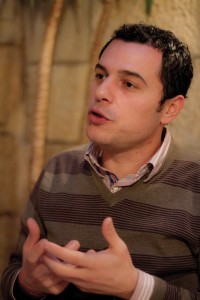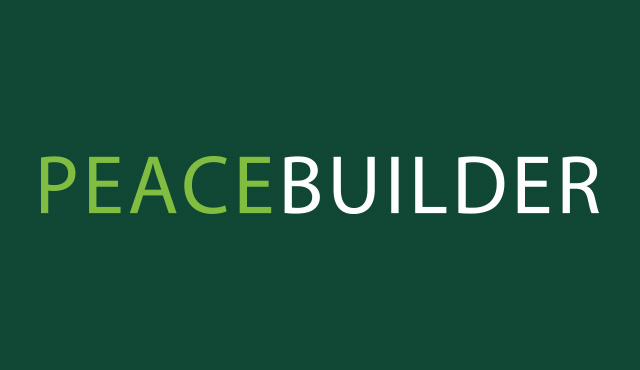This essay represents an excellent follow-up to the fall/winter 2012 issue of Peacebuilder magazine (both print and online), containing articles on the work of Fadi Rabieh and 24 other CJP alumni in the Middle East. In this essay, Rabieh offers a broad view of the steps Israelis and Palestinians must take to achieve peace.

I believe in the goodness of human beings and in our ability to transcend above and beyond our painful history to find ways of coping and healing. Over the past two years there has been growing skepticism about the impact of people-to-people projects, especially among the young generation. It is extremely challenging to find people from both sides who are interested in meeting and listening to one another. People are tired of even talking! The cynics say we have tried negotiation and dialogue for over fifteen years, and it has gotten us nowhere. The other side is not genuine and does not seek peace. Yet these voices do not recognize that we have also tried force and violence for over fifty years, and that, too, has gotten us nowhere.
As Israelis and Palestinians we have been living in a cycle of violence for so long that each side’s sense of victimhood has only become stronger with time. Both sides have constructed a narrative that is rooted in this sense of victimhood and righteousness – a narrative that dehumanizes the other; we are the good people, they are the bad ones, we seek peace, they seek war, we are the victims and only defend ourselves against their aggression, we stand alone and the entire world supports them, etc. Both narratives have been created to bolster our sense of victimhood and righteous cause.
As a result of this sense of victimhood, our brains and senses become selective. We see the world in black or white, right or wrong, with us or against us. We become increasingly judgmental and only speak the language of “facts” and the only “truth.” Interestingly, we only see what confirms our narrative and pre-constructed worldview. Throughout the years of my work in the field of peacebuilding, I have been struck by the level of ignorance and negative images both sides have of one another.
Setting Aside Stereotypes
Palestinians and Israelis from all sectors and spheres must meet each other to change these stereotypes and behavior of prejudice. Teachers must collaborate to create a dual narrative that acknowledges each side’s connection to this land, and to present a more human story of the other to the next generations. Business people must find ways where both nations can build on their capital so that communities might prosper. Journalists and media people must find ways to present constructive stories that help people become hopeful and realize the other side’s dignity. Politicians must work to find creative ways to find a proper political framework and solution that address the needs of all sectors and parties. Religious people must meet to find ways to prevent this conflict from becoming a religious one.
When the two sides come to the table, Israelis come to build a personal relationship with the Palestinians as if the occupation does not exist, and Palestinians come hoping such a meeting will end the conflict and overlook the impact of building a personal relationship. Palestinians fail to understand the collective fear experienced by Jews, and Israeli Jews fail to understand the Palestinians’ sense of loss and pain as a result of the Nakba [“catastrophe” in Arabic]. Both sides seek acknowledgment of their feelings of loss and pain. This is what any dialogue process tries to address. It tries to provide a safe space for the parties to discover the other’s humanity and have their identity needs (i.e. recognition, acknowledgment, and dignity) met.
Unlearning Hatred
Interestingly – and this is the good news – individuals and groups that engage in dialogue programs do have a positive shift in their attitudes. However, the bad news is that this shift is not sustained beyond the encounter (or the life of the project). Also, the change does not go beyond the individual to impact on the surrounding. It is naïve to believe that people will have a positive and sustained shift in attitude from one or two encounters. It is very easy to hate, and is even natural in such an intense environment. It is too painful to engage with the enemy and try to unlearn years of hatred and fear in order to trust and listen deeply. If it took people years to learn and experience fear and hate, how many years do we need to replace it with courage and acceptance?
For people-to-people encounters to succeed, they must take place within a political framework or process. The absence of such a process leaves most dialogue encounters sorely handicapped, and they fall short of having a larger impact on both societies. Relationship-building projects must coincide with progress on the political plane; otherwise the positive impact that such encounters may have will regress with the next escalation or increase in violence. Nonetheless, this does not mean we should wait for the resumption of negotiations in order to legitimize people-to-people encounters. People must meet and continue to dialogue. We need to increase the level of exposure Palestinians and Israelis have for each other, especially in light of the separation between the two peoples, and the filtered and biased news.
During the past year Palestinians witnessed an increase in so-called “anti-normalization” voices, which try to pressure and sometimes prevent Palestinians from meeting with Israelis. Despite my understanding of the rationale my fellow Palestinians try to present here (i.e., not to show that we have a normal relationship with Israelis until the occupation ends), I disagree and find it counterproductive. I believe Palestinians have a duty to engage with Israelis to get their message across, and counter a narrative that tries to delegitimize and dehumanize them. I have witnessed people change and maintain this change over a long period of time as a result of their exposure to the other narrative.
First Steps
The dialogue process begins with finding the “right” candidate and convincing him or her to engage. This in and of itself is a process of dialogue and unlearning! How do you convince people to join such projects? The personal connection is the best strategy. The core of this work is trust-building, and this involves us as workers in the field. Maintaining and expanding our relationships within and across communities – with the presence or absence of actual projects – is very important, so when the time comes people feel confident and ready to start their journey. It is extremely important to maintain our credibility within our communities and embody our values. Furthermore, people think dialogue programs must only take place between people who have not been exposed to those from the other side, or have negative perceptions. This is true to some degree, but some peacebuilding programs must also aim to energize, mobilize, and recruit active people who are willing to work for the dignity of the “other.”
I have come to realize that having a diverse group (which include people with positive experiences and perceptions of the other) is the best way to accelerate the humanization process. By witnessing the differences in opinions and positions among members of the same group, we can create the first fracture in the generalization and stereotyping of the other group (no longer do all the members of your “enemy” group look the same; some of them are actually good)! This fracture is like a seed that the dialogue process aims to plant and water. Also, those same agents help bridge the gap between the two divides because they can communicate with both sides and model the desired attitude.
Anti-normalization or convincing people to engage in dialogue are not the only challenges we face when it comes to people-to-people projects. The biggest challenge is to help people maintain open channels of communication at times of increased violence. When such incidents happen (i.e. Gaza or the Lebanon War) the dialogue process comes to halt and the goal becomes how to prevent what we have built so far from deteriorating. Sometimes one feels as if we are starting over from square one. And even in the absence of escalation in the conflict, maintaining a positive shift and relationship among group members for a long period beyond the project’s duration is a major challenge on its own.
Peacebuilders Unite!
In order to address many of the above-mentioned challenges (anti-normalization, conflict escalation, maintaining relationships and positive attitude shifts), we as peacebuilders – individuals and organizations – must think big and bold.
First, peacebuilding organizations might benefit from creating an umbrella body that could unify this effort to become more effective and efficient. Peacebuilding groups and organizations would largely benefit from having one voice, and a coordinated focused strategy to maximize their impact within their communities. Changing the culture from competition to collaboration and synergy among organizations and groups (i.e., sharing resources, expertise, and data of best practices and participants) is the best way to have long-term programs instead of short-term projects.
Second, peacebuilding organizations must transform their efforts towards a peace movement in both societies. Their efforts must be seen and heard publicly. The more peace organizations work in the shadow, the more they harm themselves. Therefore, the work must make it to the streets of Ramallah, Jerusalem, and Tel Aviv. Becoming vocal, especially at times of escalation, and taking initiative instead of reacting passively is the best strategy – not only to fill a vacuum that is caused by lack of a political process and filled by extremists and anti-normalization voices, but also to increase and regain the public’s confidence.
Here To Stay
Many people – and I am one of them – believe the two-state solution is almost over. However, this propels us to more engagement as two people to find new ways and solutions. We have no choice but to learn how to live and share this land with each other. We know we cannot defeat each other militarily, and that each nation is here to stay.
As peacebuilders we must not shy away from the challenges we face. We fight for the freedom and dignity of every individual and human being, Palestinian and Israeli, for our generation and generations to come.
This is not a matter of choice; it is a matter of destiny.
* * * *
Fadi Rabieh, who earned his master’s degree in conflict transformation as a Fulbrighter at EMU, is co-manager of the Council of Religious Institutions of the Holy Land, working out of the Jerusalem office of Search for Common Ground. He released this essay on Nov. 20, 2012.

This is a really touching and thoughtful piece, Fadi–so happy to see you’re continuing to work on and think about this, looking forward to seeing your impact continue and expand!